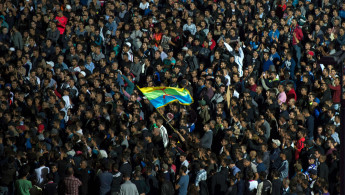Moroccans protesters demand justice and end to police chauvanism
Pro-dignity demonstrations in Morocco have continued following the death of a fishmonger in a rubbish truck, with protesters calling for 'freedom' and 'dignity'.
2 min read
Thousands have been protesting in Morocco since the death of Mouhcine Fikri [Getty]
Hundreds of Moroccans took to the streets on Saturday, demanding justice for a fishmonger whose grisly death sparked nationwide outrage about the treatment of lower-income nationals.
Demonstrators cried "freedom, justice" and "long live the people" in the northern city of al-Hoceima, where Mouhcine Fikri, 31, died last month.
He was crushed to death in a rubbish truck as he tried to protest against the seizure and destruction of swordfish, which are not allowed to be caught at this time of year.
"The royal palace is humiliating us," the protesters chanted, according to amateur live footage posted online.
A string of protests have erupted over the fish seller's death on 28 October.
King Mohammed VI was quick to order a "thorough and exhaustive investigation" into Fikri's death and sent the interior minister to offer condolences to his family.
Saturday's protest organisers said 3,000 people attended the demonstration, while local authorities put the count at 800.
Some of the demonstrators carried Amazigh - or Berber - flags while others waved pictures of a white dove as a symbol of non-violent protest.
"Dignity", "justice" and "freedom" read some of the banners held up by the protesters.
Authorities last week arrested 11 people suspected of involuntary manslaughter over Fikri's death and remanded eight in custody.
They included two interior ministry employees, two fisheries officials, the head of the local veterinary services and three rubbish collection workers.
It remains unclear who activated the truck's crushing mechanism that killed Fikri.
Thousands attended Fikri's funeral in Al-Hoceima after an image of his body - head and arm sticking out from under the lorry's crusher - went viral on social media.
The self-immolation of a street vendor in late 2010 in protest at police harassment sparked Tunisia's revolution and the Arab Spring uprisings across the region the following year.
Demonstrators cried "freedom, justice" and "long live the people" in the northern city of al-Hoceima, where Mouhcine Fikri, 31, died last month.
He was crushed to death in a rubbish truck as he tried to protest against the seizure and destruction of swordfish, which are not allowed to be caught at this time of year.
"The royal palace is humiliating us," the protesters chanted, according to amateur live footage posted online.
A string of protests have erupted over the fish seller's death on 28 October.
King Mohammed VI was quick to order a "thorough and exhaustive investigation" into Fikri's death and sent the interior minister to offer condolences to his family.
Saturday's protest organisers said 3,000 people attended the demonstration, while local authorities put the count at 800.
Some of the demonstrators carried Amazigh - or Berber - flags while others waved pictures of a white dove as a symbol of non-violent protest.
"Dignity", "justice" and "freedom" read some of the banners held up by the protesters.
Authorities last week arrested 11 people suspected of involuntary manslaughter over Fikri's death and remanded eight in custody.
They included two interior ministry employees, two fisheries officials, the head of the local veterinary services and three rubbish collection workers.
It remains unclear who activated the truck's crushing mechanism that killed Fikri.
Thousands attended Fikri's funeral in Al-Hoceima after an image of his body - head and arm sticking out from under the lorry's crusher - went viral on social media.
The self-immolation of a street vendor in late 2010 in protest at police harassment sparked Tunisia's revolution and the Arab Spring uprisings across the region the following year.





 Follow the Middle East's top stories in English at The New Arab on Google News
Follow the Middle East's top stories in English at The New Arab on Google News
![Israeli forces ordered bombed Gaza's Jabalia, ordering residents to leave [Getty]](/sites/default/files/styles/image_330x185/public/2176418030.jpeg?h=a5f2f23a&itok=_YGZaP1z)

